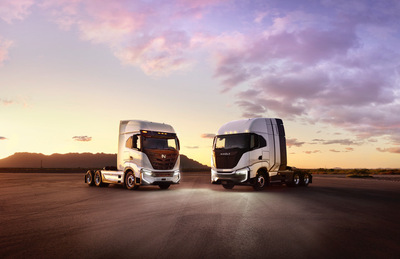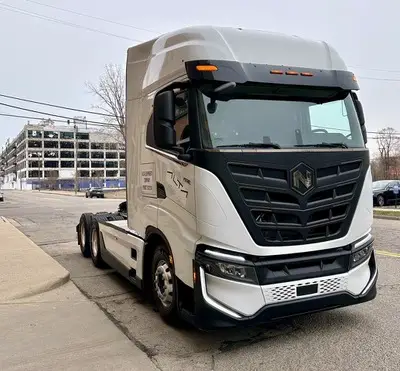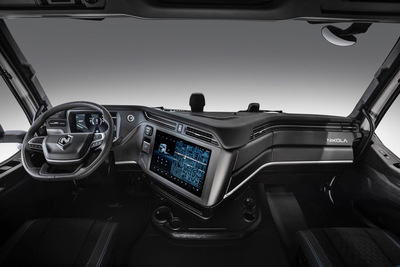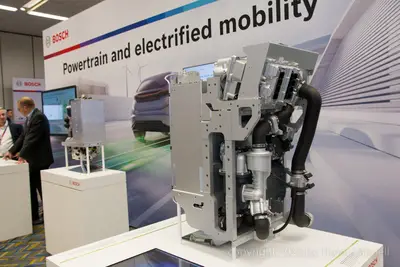Nikola Fuel Cell Class 8 Truck on the Road This Summer Will fuel cell technology be the end game?
By Thom Cannell
and Steve Purdy
Senior Detroit Editors
TheAutoChannel.com
March 31, 2023 – Detroit, MI
Nikola Corporation, despite its rocky origin, is delivering battery-powered Class 8 trucks to customers now - not really soon, but now. We heard today that in a few months they will also be delivering the first fuel-cell versions of that same truck, and they already have 100 orders. No longer will the EV Nikola semi-tractor need a huge, heavy battery pack. Instead, a much lighter, high-density fuel tank will carry enough hydrogen fuel to make electricity as it goes, meaning a much longer range than the battery version. This will be the first big truck application on the road commercially in what, most futurists would say, promises to be the ultimate goal for electrification of transportation.
The presentation to Detroit’s Automotive Press Association was hosted at the Piquette Museum, Henry Ford’s first purpose-built auto factory where he created the Model T and built the first run of the car that changed the world. Nikola CEO, Michael Lohscheller, said he expects their new truck to lead a change in the world of trucking and said the company is “more than trucks, more than energy.” Based in Coolidge, Arizona with a second factory in Ulm, Germany, Nikola uses regional dealers as partners, rather than establishing stand-alone sales and service points, to market the trucks as well as produce and distribute the hydrogen fuel.
Lohscheller spoke about how high-volume customers relate purchasing to ESG commitment, and they want clarity on actual carbon impacts of either battery-electric or fuel-cell electric trucks. The “Tre FCEV” is powered by a Bosch fuel cell sharing the rest of its components with the company’s battery-electric truck.
Of course, the carbon footprint of any vehicle is partly related to energy source. Are the electrons generated by burning coal, by hydro generation, nuclear, or wind and solar, or a liquid fuel – in this case hydrogen - that was produced by one of these sources? Each has a place, but each has issues to address. Surprising was the suggestion that wind and solar power would expand 5X over the next five years. Generous government subsidies for these trucks and infrastructure can be complex but will heavily influence cost/benefit considerations within this market.
Nikola’s Tre BEV delivers a 330-mile range and will charge to 80 percent in 120 minutes. Its Tre FCEV, or fuel cell EV, has a 500-mile range and a diesel-like 20-minute refueling time. Both trucks are intended for local and regional use, rather than long-haul. That may change as infrastructure develops more widely.
Carey Mendes, President of HYLA, Nikola’s hydrogen energy brand, delivered more information on their outlook, including a five-year vision. Mendes says the company will focus on creating hydrogen hubs and mobile fueling stations in the near term, with a goal of 60 stations in operation by 2026 and supplying 300 tons per day of fuel. That’s enough hydrogen for 7,500 FCEV trucks. The mobile fueling stations, Nikola’s creation and available today, haul the lighter-than-air gas in proprietary tanks at 700 bar—10,000 psi. He expects infrastructure, not surprisingly, to center around southern California and Nevada in the near term, a 300-mile radius to hydrogen production hubs.
In our Q and A session, discussions related to how implementing either technology is impacted by state and local regulations - the differences among hydrogen fuels: “Green” energy from electrolysis and wind/solar power, “Pink” from electrolysis and nuclear, “Blue,” “Gray” . . . and the list goes on. How the hydrogen is produced affects its environmental carbon. Price target is $3 per kilogram, making hydrogen competitive with diesel fuels.
Note that Hyundai, Toyota and Volvo all have FCEV trucks in testing. Nikola, with deliveries starting in Q4 2023, appears to be leading this race.
© Cannell and Associates, and Shunpiker Productions






